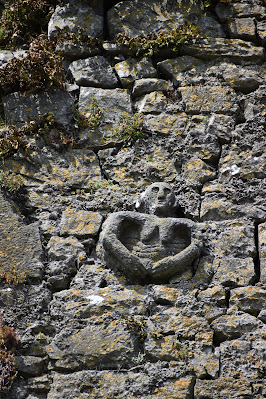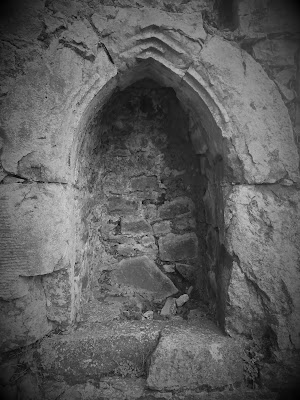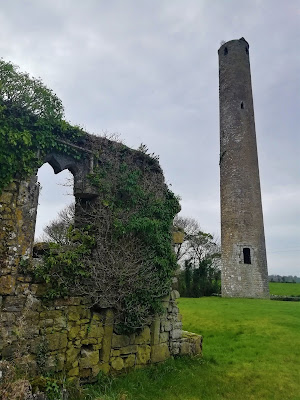Cullahill Castle
Cullahill, also known as Cullohill is a small village in South Laois, roughly five Kilometres Southwest of Durrow on the R 639 or five Kilometres from Johnstown in Kilkenny if travelling northwards on the R 639.
It’s the kind of
village dissected by a major road that travellers pass straight through without
noticing much but there’s plenty to see here for those who take the time to stop.
Of its many
interesting features, Cullahill Castle and ruins are hidden a mere 100
metres away on the L 1756 behind the Petrol Station on the main road in the
village. It was built in 1425 by Finghin Mac Giolla Phádraig (Fitzpatrick) and
destroyed by Cromwellian forces in the 17th Century.
It's a surprisingly
beautiful and well maintained location. Here at Cullahill are to be found the
impressive ruins of Cullahill Castle itself, the ruins of the Church associated
with the Castle, a beautiful old Lime Kiln, a mass of flower covered and well
kept grassy lawns and a short but stunningly beautiful nature trail starting from beside the Church
ruins.
There is a Sheela na Gig high up on the walls of Cullahill Castle, one of the few in Laois.
The Sheela na Gig is very well preserved. No one is quite sure what these mysterious medieval figures were meant to represent.
The area is immaculately kept and a credit to the residents of the village. As of Feb 2019 there
were small works here which look like the base for seating to be installed.
I passed the Castle
once before by bike but in a group so I didn’t have the opportunity to stop.
There's a niceNature trail and another Lime Kiln is here, though not as well
preserved.
Signage indicating
way marked walking and cycling routes are located here as well. All in all it’s
a very pretty and historic location in its own right and well worth stopping to
see.
On the opposite side
of the village from the Castle on the L 1558 is Saint Tighearnach’s Church of
Ireland and Memorial Garden. The memorial garden is a small tranquil location,
nothing on a grand scale but just the spot to take a minute or two for clearing
the head and relaxing.
The sign for
Cullahill Castle is the standard small Brown tourist information sign and hard
to spot but you can see the Castle from the Petrol Station. The Brown signs are
losing their relevance anyway as more and more appear which have little if anything
to do with tourist information.
About 6 Kilometres
from Cullahill travelling Southbound on the R 639 is the Round Tower and ruined
Church of Grangefertagh which lies just across the county border in
Kilkenny and is rarely visited.
In the Church ruins there is a
beautiful old Effigy Tomb. At one stage it looks like the inside of the Church
ruins were turned into a Hand Ball alley which is just as well as it probably
helped preserve the ruin from further decay.
Strangely there is no
signage I could see at all for Grangefertagh. It’s almost as if this beautiful
Round Tower and Church ruin have been completely forgotten about.
A Monastery
was founded at Grangefertagh in the 6th Century by Saint Ciaran.
The Round Tower dates
from the 10th Century and the Church ruin is from a 13th
Century Agustinian Priory.
The effigy Tomb is
one of the Mac Giolla Phádraig’s (Brian or Seaghán ?), a Lord of Ossory and his
wife. Which one I’m uncertain as different sources make different claims. It
dates sometime around 1450 or 1550 depending upon which source you believe.
To find Grangefertagh
Round Tower head southbound from Cullahill on the R 639 for about 5 kilometres.
You’ll see the Round Tower across the road in the fields on your right after a
few Kilometres. Look out for signs to the right signed Galmoy and Galmoy GAA
and it’s about another Kilometre after turning.
It’s easy enough to find when
you know it’s there and as with Cullahill it’s well worth taking the time to visit.
Just reverse these directions if you’re coming from Johnstown.
It’s impossible to
know how many of these historic heritage sites will be still standing fifty
years from now so I think that’s all the more reason to see them now while they
are still here to appreciate.




















